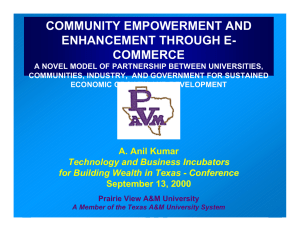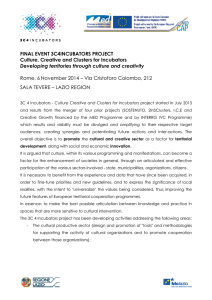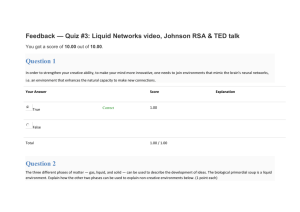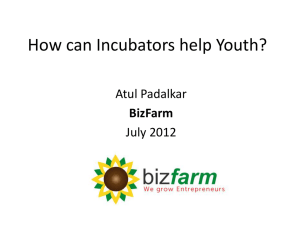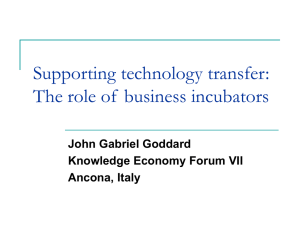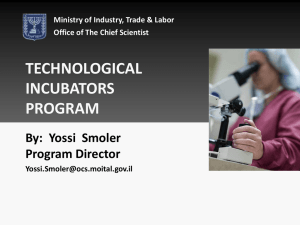INTERNATIONAL TELECOMMUNICATION UNION Telecommunication Development Bureau (BDT) Document TDAG-2/15-E
advertisement
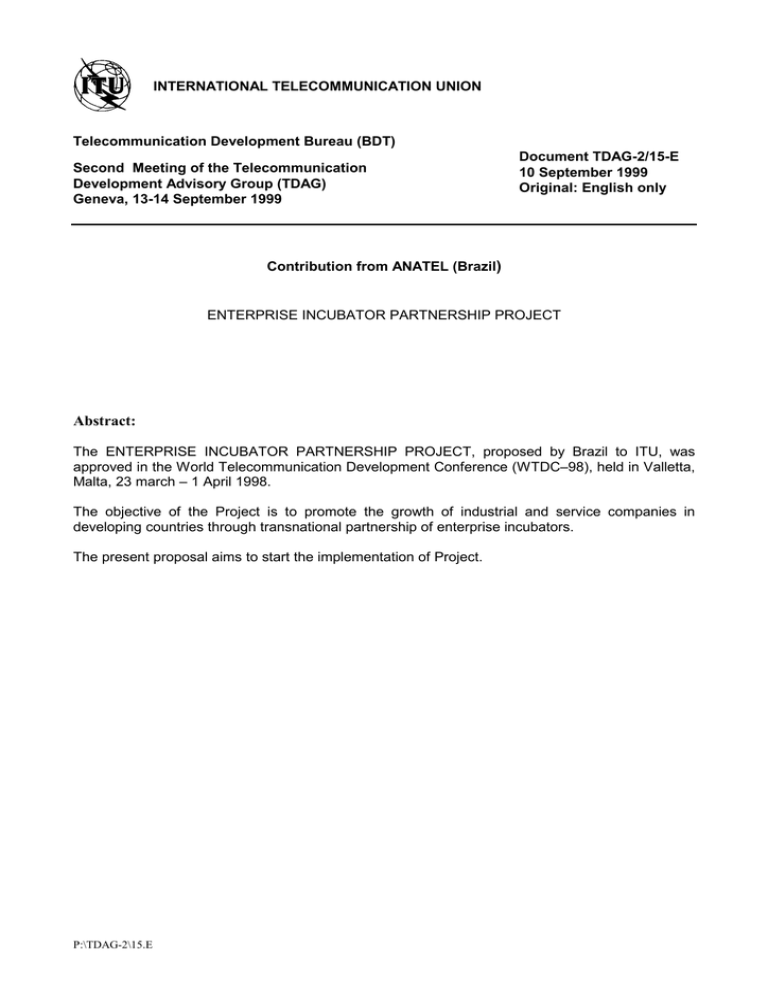
INTERNATIONAL TELECOMMUNICATION UNION Telecommunication Development Bureau (BDT) Second Meeting of the Telecommunication Development Advisory Group (TDAG) Geneva, 13-14 September 1999 Document TDAG-2/15-E 10 September 1999 Original: English only Contribution from ANATEL (Brazil) ENTERPRISE INCUBATOR PARTNERSHIP PROJECT Abstract: The ENTERPRISE INCUBATOR PARTNERSHIP PROJECT, proposed by Brazil to ITU, was approved in the World Telecommunication Development Conference (WTDC–98), held in Valletta, Malta, 23 march – 1 April 1998. The objective of the Project is to promote the growth of industrial and service companies in developing countries through transnational partnership of enterprise incubators. The present proposal aims to start the implementation of Project. P:\TDAG-2\15.E 2 TDAG-2/15-E 1. DEFINITIONS By Enterprise Incubator is meant an ambiance designed to promote the process of creation and evolution of competitive products and companies. The main characteristic of an enterprise incubator is to provide the essential services to support that process for associated emerging companies, at low costs. Among those services one may point out: •= •= •= •= •= •= place and address administrative and account services support services (telecommunications, copies, etc) shared equipments and laboratories interaction with universities, research centers, companies and customers advisement services (business plan, product development, marketing, etc). •= By Pilot Incubator is meant an experimental incubator in developing countries, with emphasis in LDCs (Less Developed Countries), that receives systematic assistance from a Pilot Incubator Partner. By Pilot Incubator Partner is meant a successful enterprise incubator which provides advice to a Pilot Incubator in another country. By Players are meant entities that participate in the Project, as Pilot Incubators, Pilot Incubator Partners, authorities and agencies of interested countries, international and regional organizations, financial agents, associations of incubators, services and industrial companies, associations of companies and experts in the field. By Emergent Companies are meant the enterprises that have been created or have been admitted in the ambience of an Enterprise Incubator. 2. OBJECTIVES The project approved in Malta is directed towards four major goals: 1. “To promote transnational partnership of enterprise incubators, in the telecommunication sector, involving developing countries; 2. To promote transnational partnership of emergent companies, in the telecommunication sector, involving developing countries; 3. To promote education and training, in developing countries, on the complete industrial cycle, from the design of products and services to the establishment and operation of the corresponding companies. 4. To promote, in developing countries, the conditions required for successful enterprise incubators”. In order to achieve those goals, this Proposal pursues the following objectives: In the short term: 1. To prepare in developing countries, with emphasis in LDCs, a group capable of planning, setting up and operating enterprise incubators. 2. To set up 5 Pilot Incubators in developing countries, with emphasis in LDCs, focusing telecommunications and the convergent telecommunications - computers sector. P:\TDAG-2\15.E 3 TDAG-2/15-E 3. To develop a methodology for implementing incubators and fostering the development of industrial and services enterprises in developing countries, in special in telecommunications and the telecommunications-computer convergent sector. In the medium and long term: 1. To implement new incubators in the developing countries, with emphasis in the LDCs, that have participated of the Pilot Incubators experience. 2. To spread the experience to others developing countries. 3. To promote the development of entrepreneurship and industrial ambiance in developing countries, with emphasis in LDCs, in special in telecommunications and in the telecommunicationscomputers convergent sector. 3. PRODUCTS 3.1. Starting Plan Document The Starting Plan Document will include: •= List of developing countries and other Players interested in participating in the Project. •= List of National Coordinators designated by participants developing countries to coordinate the Pilot Incubator experience in the country. •= List of necessary conditions to implement and run Pilot Incubators. •= List of potential Incubator Partners. •= List of criteria based on successful incubators in developing countries to assess Pilot Incubators candidatures. •= Content and format of a survey to collected information in order to identify necessary actions and resources to initiate the Pilot incubators implementation. 3.2. Guide for Pilot Incubators The Guide for Pilot Incubators will subsidize each National Working Group (congregating persons as the National Coordinator, Incubator Managers and other members of Incubators staff) to prepare the National Plan for Incubators as well as to implement Pilot Incubators. 3.3. Survey on Pilot Incubator Conditions The Survey on Pilot Incubator Conditions will show the situation of each participant developing country regarding the basic conditions to implement Pilot incubators as well as will show the necessary actions and resources to initiate such a program. 3.4. Seminars and Courses on Incubators and Entrepreneurship Seminars and Courses on Incubators and Entrepreneurship will prepare the human resources from participant developing countries to plan, implement and operate incubators as well as to foster the creation and development of industrial and services companies, in special in telecommunications and in the telecommunications-computers convergent sector. 3.5. National Plan for Incubators The National Plan for Incubators will describe the objectives, actions and resources to implement incubators in each participant developing country. P:\TDAG-2\15.E 4 TDAG-2/15-E 3.6. Methodology for Incubators in developing countries. The Methodology for Incubators in Developing Countries will summarize all the experience grasped throughout the Project to support the development of enterprise incubators and of industrial and service companies in developing countries. 4. ACTIVITIES 4.1. Selection of the Technical Coordination by ITU among experts in spreading incubator experiences in developing countries. 4.2. Elaboration of Starting Plan Document by the Technical Coordination. 4.3. Nomination of National Coordinators and other participants of National Working Groups. 4.4. Elaboration of the Guide for Pilot Incubators. 4.5. Regional Seminars to present the Project and to train the National Groups to implement the Survey on Pilot Incubator Conditions. 4.6. Implementation of the Survey on Pilot Incubator Conditions. 4.7. One-Week Regional Seminars to train National Working Groups to use the Guide for Pilot Incubators and to elaborate the National Plan for Incubators. The Seminar must count on direct and effective participation of the National Working Groups in order to allow adherence to the real possibilities and necessities of each participant developing country. 4.8. Implementation of the National Plan by each participant developing country. 4.9. Evaluation of the Project. 4.10. Elaboration of the Methodology for Incubators in Developing Countries. 5. HUMAN RESOURCES •= ITU Executive-Coordinator: 1 •= Technical Coordination: 2 experts •= National Coordinators: 5 (1 per LDC) •= Incubator Managers: 5 (1 per Pilot Incubator - can be the National Coordinator) •= Experts from Pilot Incubator Partners: 5 (1 per Pilot Incubator) •= Entrepreneurs and staff of Emergent Companies in LDCs: 50 (10 per Pilot Incubator, supported by fellowships to develop innovative products) P:\TDAG-2\15.E 5 TDAG-2/15-E 6. TIME SCHEDULE ACTIVITIES Select and contract the Technical Coordination Starting Plan elaboration Nomination of National Coordinators and other participants of the National Working Groups. Elaboration of the Guide Regional Seminars Survey implementation Training Seminar for National Working Groups. Implementation of National Plans Evaluation of the Project Elaboration of the Methodology for Incubators in Developing Countries. MONTHS 1 2 3 4 5 6 7 8 9 1 1 1 1 1 1 1 1 1 1 2 2 2 2 24 0 1 2 3 4 5 6 7 8 9 0 1 2 3 t0 36 X X X X X X X X X X X X X X X x X X X X x x x x x x x x X X X X X X X X X X x X X X X X x X x ANNEX TO PROPOSAL ENTERPRISE INCUBATOR PARTNERSHIP PROJECT A reading on Enterprise Incubators in Brazil* Brazil counts, in July 1999, with nearly one hundred enterprise incubators, which shelter nearly 800 emergent enterprises. Besides those companies, there are 250 “graduate enterprises”, that is to say, companies that already left the incubators and are in the market by their own. The number of jobs created in the mentioned 800 emergent enterprises is nearly 3.000, reflecting the fact that enterprises in incubators are initially small in size. These numbers encompass “technology – based enterprise incubators” and “mixed enterprise incubators”, understood as those that shelter emergent enterprises regardless being or not intensive in technology. P:\TDAG-2\15.E 6 TDAG-2/15-E The incubator movement in Brazil begin in the mid of the 1980’s, within universities. In the last five years the movement grew significantly, and incubators begin to be set up also by research centers, government agencies, great companies, and associations. Nearly half of the enterprises in incubators work on the telecommunication-computer convergent sector. Other important areas of work are biotechnology, agribusiness, mechanics and chemistry. In general, the products of the mentioned enterprises are very innovative and answer to new or unfurnished specific needs of the country. The Brazilian incubators, science parks, technology poles and “innovative development poles” have an association, called ANPROTEC, that regularly offers courses on subjects related to the set up and operation of incubators and promotes the interaction between enterprises in incubators and the market. More information about ANPROTEC can be obtained at http://www.anprotec.org.br or at ANPROTEC, c/o CDT - Centro de Apoio ao Desenvolvimento Tecnológico, Faculdade de Tecnologia, Universidade de Brasília, Brasilia, DF, 70910-900, Brazil, tel/fax: + 55 61 347 07 22. _____________ P:\TDAG-2\15.E

